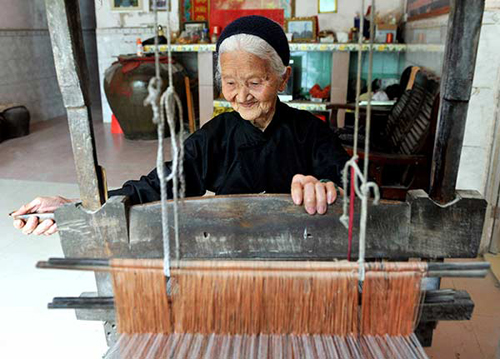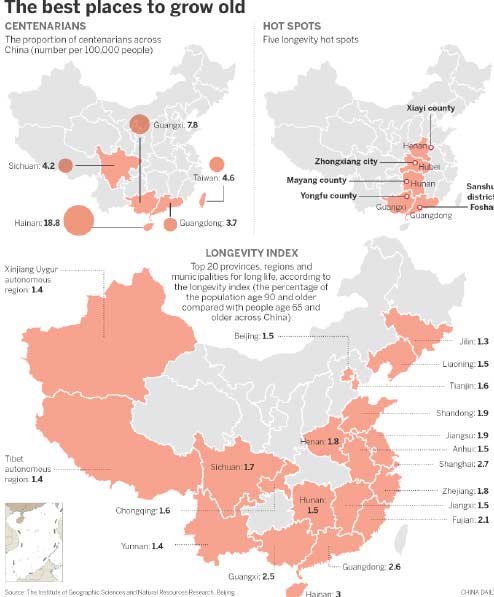Charting a New Course for a Happy Old Age
 |
|
A senior practices dance steps in Sanya, Hainan province. The island has become a haven for elderly Chinese. [Photo/Xinhua] |
A map that shows China's 'longevity hot spots' is prompting seniors to relocate in the hope of ensuring a healthier, more peaceful retirement. Cheng Yingqi reports.
The seemingly ever-present gray haze that has hung in the skies of North China this winter has prompted many people to consult a scientific resource that may contain the secret of a long, healthy life - a map that illustrates the geological distribution of centenarians around the country.
Recently, the map has been forwarded more than 100,000 times on Wechat, one of the country's most influential social media platforms, and its growing popularity has led many seniors to consider a change of lifestyle and relocate to areas with green hills and blue skies to ensure a pleasant old age and longer life.
Scientists from the Institute of Geographic Sciences and Natural Resources Research, which is affiliated with the Chinese Academy of Sciences, have been studying the relationship between geography and health since 1968.
Using data from China's sixth national population census in 2010 and the results of surveys that measured the levels of trace elements in water, soil, crops and the hair and fingernails of centenarians in different locations, they created an index to mark China's "long-life" provinces and towns.
Early in 2015, they published a paper, the result of decades of research in the field, in Scientific Decision Making, a science journal, which noted that China's longest-living populations are distributed unevenly across the country.
For example, the number of centenarians nationwide is 2.7 per 100,000 people, but in Hainan, China's southernmost province, the density is nine times higher.
Regional differences
Generally, in southern China, centenarians and people of advanced age account for a higher proportion of the senior population - that is, people age 65 and older - especially the Yangtze and Pearl River deltas, where the climate is mild and there is abundant forestry coverage.
Trace elements in the soil in these areas were found to have a correlation with longevity: regions with large numbers of centenarians and significantly older people usually have higher levels of cobalt, a key component of vitamin B, and selenium, which aids the function of the thyroid gland.
However, the samples also showed lower levels of heavy metals, such as mercury and lead, which can be harmful to human health, in soil, water and crops. In addition, a number of characteristics common among long-lived populations include a positive attitude, a lighter diet and a higher intake of vegetables.
"Geography influences people's health in many ways. So-called longevity towns are an integration of genes, mental factors, the natural environment and social environment," said Wang Wuyi, a researcher at the Institute of Geographic Sciences and Natural Resources Research in Beijing.
He believes that older people should be encouraged to visit or relocate to longevity towns.
"The green hills, blue skies, beautiful scenery, nourishing food and a harmonious social environment are all good for long life," he said.
Huang Magan operates a loom at age 107 in 2012 in the Bama Yao autonomous county in the Guangxi Zhuang autonomous region, a famous 'longevity' area. [Photo/Xinhua]
Striking a balance

The best-known long-life areas, such as the Bama Yao autonomous county in the Guangxi Zhuang autonomous region, and Hetian, a city in the Xinjiang Uygur autonomous region, have been popular tourist spots for many years, but their relative isolation means that they can be inconvenient places to live.
As a result, when older people are choosing a new place to settle down, many attempt to strike a balance between convenience and beautiful, natural, pollution free surroundings.
"I chose to buy a house in Huangshan, a city in Anhui province, not only for the good quality of the air and water, but also because the high-speed train can take me from Beijing to the city in six hours," said Wang Jing, 52, from Beijing.
Wang started planning her retirement six years ago when her daughter enrolled at a university in Hefei, the capital of Anhui. She visited Huangshan several times before she decided to buy a house in the city.
"When I retire at age 55, my daughter will have reached the right age for marriage. By that time, I will no longer need the house in Beijing so I will give it to her and I will move to Huangshan," she said.
The journey time of six hours by train would allow Wang to travel between Huangshan and the capital without too much difficulty. Even if she needs to babysit a grandchild someday, she is confident that her daughter and future son-in-law will be happy to let their child spend the winters in a place that's relatively unaffected by air pollution.
Zhang Ping, an expert in commercial property, said provinces such as Yunnan and Hainan, and cities such as Xiamen, Fujian, and Zhuhai in Guangdong province, have booming housing markets for senior buyers. "Convenient locations, good infrastructure and high-quality healthcare are equally as important as the environment for older people when they are choosing a place to live after retirement," said Zhang, chair of the Royal Institution of Chartered Surveyors' China Commercial Property Professional Group Committee, the Chinese branch of an international professional body that accredits professionals in the land, property and construction sectors.
Wang Guiyun, 72, from Hebei province, foresaw the growth of the seniors' property market more than 10 years ago, so she bought a house in Haikou, the capital of Hainan.
"At that time, few people were really aware of the pollution problem, but every year many of my friends relocated to spend the winter in warmer cities, a practice that was believed to benefit people with cardiovascular disease," she said.
"I visited Haikou and found that the city was full of nonnative seniors living in rented houses. I bought a house here because the continuous influx of seniors means property prices are unlikely to fall," she said.
Media reports show that the average price of a house in Haikou quadrupled between 2002 and 2011, but remained relatively stable in the years that followed.
Despite the rising number of elderly people seeking a pastoral retired life, China's insurance regulations, which prevent people from claiming reimbursement of medical expenses in hospitals outside of the place they made social security payments when they were working, will be the biggest obstacle, according to Zhang, the realty expert.
"The problem needs to be addressed via joint efforts by the government and developers to develop properties to add value in geriatric care, tourism and healthcare. Additions such as these would produce the most attractive properties in the future," she said.(China daily)

Download attachments:


